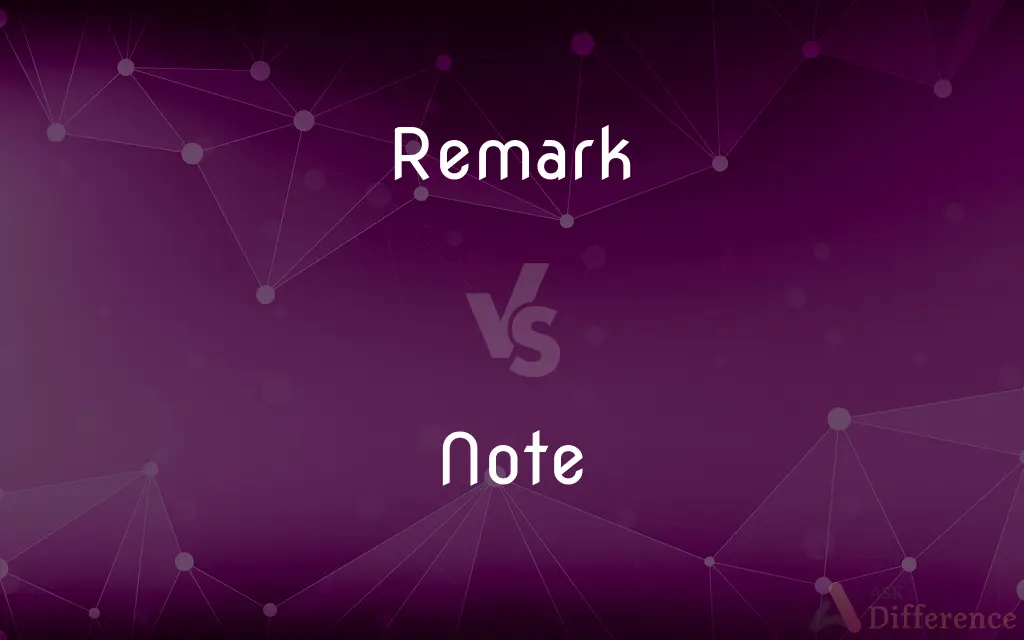Remark vs. Note — What's the Difference?
By Tayyaba Rehman — Updated on November 2, 2023
A remark is a spoken or written opinion or comment, while a note is a brief record of facts, topics, or thoughts written down as an aid to memory.

Difference Between Remark and Note
Table of Contents
ADVERTISEMENT
Key Differences
A remark is often made spontaneously and can be either positive or negative. It’s a statement that expresses an opinion or observation and can be delivered verbally or in writing. Remarks can be informal, such as a comment made in a conversation, or more formal, such as those given by a speaker at a conference.
A note, on the other hand, is a written record of something that is often used for future reference. Notes are usually short and to the point, intended to jog the memory or document something important. They are practical in nature and can be found in various formats, such as sticky notes, notepad entries, or digital memos.
While remarks can sometimes be forgettable or insignificant, notes are typically made with the intention of being reviewed later. Remarks are about expression and are often shared, while notes are about retention and can be personal. However, both can be shared with others or kept private, depending on the context.
Remarks can also be evaluative, providing feedback or criticism, whereas notes are typically neutral, intended to capture information without judgment. The content of a remark is usually subject to the perspective of the individual, whereas a note is expected to be a factual record or reminder.
Each has its place in communication: remarks are about participation and reaction in a moment, and notes are about documentation and reference for the future. They both serve important but distinct purposes in our daily lives.
ADVERTISEMENT
Comparison Chart
Definition
An observation or opinion.
A brief record or reminder.
Purpose
To express or communicate a thought or feedback.
To document information for future reference.
Form
Can be spoken or written.
Primarily written.
Formality
Can be formal or informal.
Typically informal but can be part of formal documentation.
Duration
Often spontaneous and transient.
Intended for persistence and review.
Compare with Definitions
Remark
An observation or comment.
She made a clever remark during the meeting.
Note
A brief record for later reference.
She left a note to remind herself of the appointment.
Remark
A casual or spontaneous comment.
He made a funny remark that made everyone laugh.
Note
A brief comment or explanation.
The editor added a note to clarify the text.
Remark
Feedback or criticism.
The reviewer's remark on the film was quite harsh.
Note
A brief record, especially one written down to aid the memory
Took notes on the lecture.
Remark
A verbal or written opinion.
His remark about the event was surprisingly positive.
Note
A comment or explanation, as on a passage in a text
The allusion is explained in the notes at the end of the chapter.
Remark
A notice of some fact or occurrence.
The teacher’s remark on his behavior was noted by the principal.
Note
A brief informal letter
Sent a note to the child's teacher.
Remark
To express briefly or casually as a comment
She remarked that he danced very well.
Note
A formal written diplomatic or official communication.
Remark
To take notice of something; observe
"She climbed the stone steps quickly, remarking the queer look of her blue silk skirt and blue shoes upon the stone" (Virginia Woolf).
Note
A piece of paper currency.
Remark
An act of pointing out or noticing; notice or observation.
Note
A debt security, usually with a maturity of ten years or less.
Remark
An expression, in speech or writing, of something remarked or noticed; a mention of something
Make a remark
Pass a remark
A biting remark
A funny remark
A spoken remark
Note
A promissory note.
Remark
A casual observation, comment, or statement
Note
A tone of definite pitch.
Remark
(engraving) remarque
Note
A symbol for such a tone, indicating pitch by its position on the staff and duration by its shape.
Remark
Alternative spelling of re-mark
Note
A key of an instrument, such as a piano.
Remark
(transitive) To pay heed to; notice; to take notice of, to perceive.
Note
The characteristic vocal sound made by a songbird or other animal
The clear note of a cardinal.
Remark
To pass comment on (something); to indicate, point out.
Note
The sign of a particular quality or emotion
A note of despair in his remarks.
A note of gaiety in her manner.
Remark
To mark (someone or something) out; to distinguish, to make notable.
Note
A distinctive component of a complex flavor or aroma
A full-bodied wine with notes of cherry and musk.
Remark
To express in words or writing; to state, as an observation.
He remarked that it was getting late.
Note
Importance; consequence
Nothing of note happened.
Remark
(intransitive) To make a remark or remarks on, to comment on (something).
Note
Notice; observation
Quietly took note of the scene.
Remark
Alternative spelling of re-mark
Note
(Obsolete) A song, melody, or tune.
Remark
To mark in a notable manner; to distinquish clearly; to make noticeable or conspicuous; to piont out.
Thou art a man remarked to taste a mischief.
His manacles remark him; there he sits.
Note
To observe carefully; notice
Note the difference between these two plants. ].
Remark
To take notice of, or to observe, mentally; as, to remark the manner of a speaker.
Note
A symbol or annotation.
Remark
To express in words or writing, as observed or noticed; to state; to say; - often with a substantive clause; as, he remarked that it was time to go.
Note
A mark or token by which a thing may be known; a visible sign; a character; a distinctive mark or feature; a characteristic quality.
Remark
To make a remark or remarks; to comment.
Note
A mark, or sign, made to call attention, to point out something to notice, or the like; a sign, or token, proving or giving evidence.
Remark
Act of remarking or attentively noticing; notice or observation.
The cause, though worth the search, may yet eludeConjecture and remark, however shrewd.
Note
A brief remark; a marginal comment or explanation; hence, an annotation on a text or author; a comment; a critical, explanatory, or illustrative observation.
Remark
The expression, in speech or writing, of something remarked or noticed; the mention of that which is worthy of attention or notice; hence, also, a casual observation, comment, or statement; as, a pertinent remark.
Note
A written or printed communication or commitment.
Remark
A statement that expresses a personal opinion or belief;
From time to time she contributed a personal comment on his account
Note
A brief piece of writing intended to assist the memory; a memorandum; a minute.
I left him a note to remind him to take out the trash.
Remark
Explicit notice;
It passed without remark
Note
A short informal letter; a billet.
Remark
Make mention of;
She observed that his presentation took up too much time
They noted that it was a fine day to go sailing
Note
(academic) An academic treatise (often without regard to length); a treatment; a discussion paper; (loosely) any contribution to an academic discourse.
Remark
Make or write a comment on;
He commented the paper of his colleague
Note
A diplomatic missive or written communication.
Note
(finance) A written or printed paper acknowledging a debt, and promising payment
A promissory note
A note of hand
A negotiable note
Note
(obsolete) A list of items or of charges; an account.
Note
A piece of paper money; a banknote.
I didn't have any coins to pay with, so I used a note.
Note
(extension) A small size of paper used for writing letters or notes.
Note
(music) A sound.
Note
A character, variously formed, to indicate the length of a tone, and variously placed upon the staff to indicate its pitch.
Note
A musical sound; a tone; an utterance; a tune.
Note
(by extension) A key of the piano or organ.
Note
(by extension) A call or song of a bird.
Note
(uncountable) Observation; notice; heed.
Note
(uncountable) Reputation; distinction.
A poet of note
Note
A critical comment.
Your performance was fantastic! I have just one note: you were a little flat in bars 35 and 36.
Note
(obsolete) Notification; information; intelligence.
Note
(obsolete) Mark of disgrace.
Note
That which is needed or necessary; business; duty; work.
Note
The giving of milk by a cow or sow; the period following calving or farrowing during which a cow or sow is at her most useful (i.e. gives milk); the milk given by a cow or sow during such a period.
Note
(transitive) To notice with care; to observe; to remark; to heed.
If you look to the left, you can note the old cathedral.
Note
(transitive) To record in writing; to make a memorandum of.
We noted his speech.
Note
(transitive) To denote; to designate.
The modular multiplicative inverse of x may be noted x-1.
Note
(transitive) To annotate.
Note
(transitive) To set down in musical characters.
Note
To record on the back of (a bill, draft, etc.) a refusal of acceptance, as the ground of a protest, which is done officially by a notary.
Note
To butt; to push with the horns.
Note
To notice with care; to observe; to remark; to heed; to attend to.
No more of that; I have noted it well.
The world will little note, nor long remember, what we say here, but it can never forget what they did here.
Note
To record in writing; to make a memorandum of.
Every unguarded word . . . was noted down.
Note
To charge, as with crime (with of or for before the thing charged); to brand.
They were both noted of incontinency.
Note
To denote; to designate.
Note
To annotate.
Note
To set down in musical characters.
Note
Know not; knows not.
Note
Nut.
Note
Need; needful business.
Note
A mark or token by which a thing may be known; a visible sign; a character; a distinctive mark or feature; a characteristic quality.
Whosoever appertain to the visible body of the church, they have also the notes of external profession.
She [the Anglican church] has the note of possession, the note of freedom from party titles,the note of life - a tough life and a vigorous.
What a note of youth, of imagination, of impulsive eagerness, there was through it all !
Note
A mark, or sign, made to call attention, to point out something to notice, or the like; a sign, or token, proving or giving evidence.
Note
A brief remark; a marginal comment or explanation; hence, an annotation on a text or author; a comment; a critical, explanatory, or illustrative observation.
The best writers have been perplexed with notes, and obscured with illustrations.
Note
A brief writing intended to assist the memory; a memorandum; a minute.
Note
Hence, a writing intended to be used in speaking; memoranda to assist a speaker, being either a synopsis, or the full text of what is to be said; as, to preach from notes; also, a reporter's memoranda; the original report of a speech or of proceedings.
Note
A short informal letter; a billet.
Note
A diplomatic missive or written communication.
Note
A written or printed paper acknowledging a debt, and promising payment; as, a promissory note; a note of hand; a negotiable note.
Note
A list of items or of charges; an account.
Here is now the smith's note for shoeing.
Note
A character, variously formed, to indicate the length of a tone, and variously placed upon the staff to indicate its pitch. Hence:
The wakeful bird . . . tunes her nocturnal note.
That note of revolt against the eighteenth century, which we detect in Goethe, was struck by Winckelmann.
Note
Observation; notice; heed.
Give orders to my servants that they takeNo note at all of our being absent hence.
Note
Notification; information; intelligence.
The king . . . shall have note of this.
Note
State of being under observation.
Small matters . . . continually in use and in note.
Note
Reputation; distinction; as, a poet of note.
There was scarce a family of note which had not poured out its blood on the field or the scaffold.
Note
Stigma; brand; reproach.
Note
A short personal letter;
Drop me a line when you get there
Note
A brief written record;
He made a note of the appointment
Note
A characteristic emotional quality;
It ended on a sour note
There was a note of gaiety in her manner
He detected a note of sarcasm
Note
A piece of paper money (especially one issued by a central bank);
He peeled off five one-thousand-zloty notes
Note
A notation representing the pitch and duration of a musical sound;
The singer held the note too long
Note
A comment or instruction (usually added);
His notes were appended at the end of the article
He added a short notation to the address on the envelope
Note
High status importance owing to marked superiority;
A scholar of great eminence
Note
A tone of voice that shows what the speaker is feeling;
There was a note of uncertainty in his voice
Note
A promise to pay a specified amount on demand or at a certain time;
I had to co-sign his note at the bank
Note
Make mention of;
She observed that his presentation took up too much time
They noted that it was a fine day to go sailing
Note
Notice or perceive;
She noted that someone was following her
Mark my words
Note
Observe with care or pay close attention to;
Take note of this chemical reaction
Note
Make a written note of;
She noted everything the teacher said that morning
Note
A short informal letter or written message.
He received a thank-you note from the host.
Note
A mental or written observation.
I made a note of the key points during the lecture.
Note
A symbol denoting a musical sound.
She played every note perfectly on the piano.
Common Curiosities
Can a remark contain personal opinions?
Yes, remarks often convey personal opinions or observations.
Is it possible to take notes on remarks?
Yes, one can take notes on what is being remarked upon for future reference.
Can a remark be planned ahead of time?
Yes, some remarks are prepared in advance, especially for speeches or presentations.
Are notes used to communicate with others?
Notes can be for personal use or to convey information to others.
Are all remarks important?
Not all remarks are significant; some can be offhand or trivial.
Can a remark be written down?
Yes, a remark can be both spoken and written.
Are notes always made in writing?
While notes are typically written, they can also be recorded in digital formats.
Can a note be detailed?
Notes are generally brief, but they can be detailed if necessary.
Is a note considered formal communication?
Notes can be informal, but they can also be part of formal documentation.
Do remarks require a response?
Some remarks invite a response, while others do not.
Can remarks be edited or revised?
Written remarks can be edited, but spoken remarks cannot be changed once delivered.
Are remarks subject to interpretation?
Yes, especially spoken remarks, which can be interpreted differently based on tone and context.
How are remarks used in literature?
In literature, remarks are often used by characters to express thoughts or dialogue.
Do notes contribute to discussions?
Notes can inform discussions, especially if they contain relevant information.
Can notes be made during a conversation?
Yes, it’s common to take notes during conversations to remember key points.
Share Your Discovery

Previous Comparison
Photoblinking vs. Photobleaching
Next Comparison
Rustic vs. VintageAuthor Spotlight
Written by
Tayyaba RehmanTayyaba Rehman is a distinguished writer, currently serving as a primary contributor to askdifference.com. As a researcher in semantics and etymology, Tayyaba's passion for the complexity of languages and their distinctions has found a perfect home on the platform. Tayyaba delves into the intricacies of language, distinguishing between commonly confused words and phrases, thereby providing clarity for readers worldwide.















































